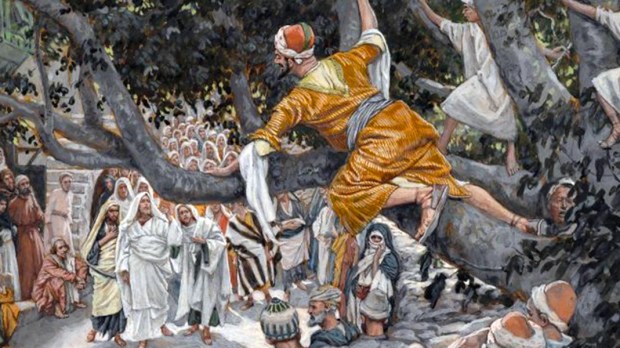Jesus meets a short man in the Gospel this Sunday, the 31st Sunday of Ordinary Time, and he becomes an underdog model for each of us.
The first key to the story are the actions of Zacchaeus, the chief tax collector who couldn’t see Jesus when he was passing through his town, so he climbs up a sycamore tree.
The second thing to notice are the actions of Jesus, who, seeing him, steps in and changes his life.
First, notice that Zacchaeus embraces his shortcomings.
Think of how often we avoid Jesus because we don’t want to look foolish: We decide we aren’t the type who goes the extra mile for their faith, so we do little. We don’t think we are articulate enough to bring him up with others, so we stay quiet. We don’t want to appear like a crazy Catholic, so we keep our faith to ourselves.
Zacchaeus isn’t like this. There are many reasons that he should feel like he isn’t good enough for the company of Jesus, and many reasons the “chief tax collector” shouldn’t climb a tree to see a preacher pass by, inviting ridicule for his size and his profession, but he ignores all that and pushes forward.
He knows what the first reading teaches: “Before the LORD the whole universe is as a grain from a balance or a drop of morning dew come down upon the earth,” says Wisdom. Every one of us is short and insignificant when we are surrounded by a universe the size of a dewdrop.
Second, Zacchaeus doesn’t make excuses once he is invited.
Jesus looked up to him and said, “Zacchaeus, come down quickly, for today I must stay at your house.” And down he came, quickly.
We might think we would be just as obedient to God, but there is a lot of evidence to the contrary: When we know we should pray and don’t, when we know we should volunteer and skip it, and when we see someone’s important need and ignore it.
But God rewards right-away obedience, especially when ….
Third, Zacchaeus’ deeds exceed his words.
When Zacchaeus says, “If I have extorted anything from anyone, I shall repay it four times over,” he is holding himself to the highest Old Testament standard, “If a man steals an ox or a sheep, and kills it or sells it, he shall pay five oxen for an ox, and four sheep for a sheep” (Exodus 22:1).
Tax collectors at his time were practically expected to keep a little extra money for themselves. Not Zacchaeus. His desire for God was greater than his desire for money, so he was willing to hold himself accountable to God’s standards, not man’s.
Now look at Jesus’ actions.
First, Jesus shows he is willing to change his plans.
The Gospel begins by saying, “Jesus came to Jericho and intended to pass through the town.”
He wasn’t looking for a special encounter with Zacchaeus; he was hurrying from point A to point C — and Zacchaeus was at point B. But then that changed.
We often consider Jesus as determined to do what he is going to do, and expect that we don’t necessarily figure into his plans. He has some great plan of his own, we figure, and we don’t want to interfere. Zacchaeus shows that if we take the time to encounter Jesus, his plan changes to include us.
Second, Jesus invites himself into our lives.
Seeing Zacchaeus in the tree, Jesus says “Zacchaeus, come down quickly, for today I must stay at your house.”
If we think we need to create the perfect conditions for Jesus and invite him in when we are ready, we should think again. Jesus comes when we least expect it — not on our terms, but on his, even when it causes controversy.
In the Gospel, “When they all saw this, they began to grumble, saying, ‘He has gone to stay at the house of a sinner.’” In our lives, people might talk in the same way, thinking we’re not the religious type. The Lord says: “Let them talk, and let me in.”
In short, Jesus finds underdogs irresistible.
Zacchaeus is the model of the prayer lessons Jesus has shared in the last four Gospels — and they are all about underdogs.
Zacchaeus is humble and grateful, like the leper who came back to thank him. Zacchaeus is small but resourceful, like the widow and the unjust judge. He is both a prayerful tax collector and an important person like the two characters in last week’s parable.
St. Paul’s prayer in the second reading is for all of us underdogs. He prays that “our God may make you worthy of his calling and powerfully bring to fulfillment every good purpose and every effort of faith, that the name of our Lord Jesus may be glorified in you.” Amen.

